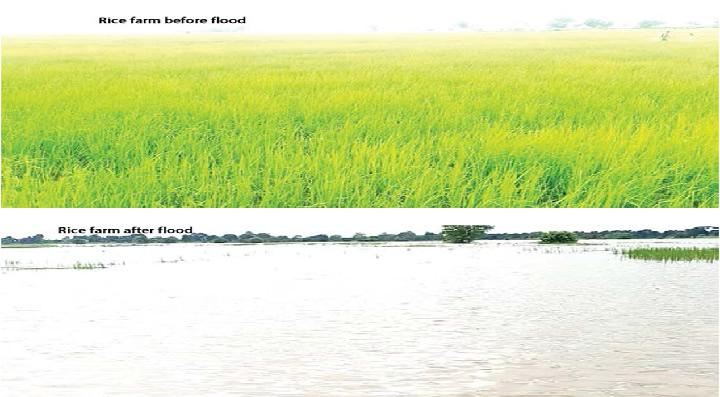
Many are still counting their losses from the recent flood disaster that ravaged more than 30 states of the country. Deborah Dan-Awoh examines the long-term effect it would have on SMEs in the affected states
After the death of over 600 people, and the destruction of more than 82,000 homes and farmlands submerged, the future seems bleak for Micro, small and medium enterprises in Nigeria.
The torrential rain which began in June 2022, resulted in floods that swept through more than 30 states of the country. It was worsened following the opening of the Lagdo Dam in Cameroon. Nigeria had gone through similar flood experiences that stalled economic growth in 2012, 2013 and 2018.
The PUNCH reported that the Permanent Secretary in the Ministry of Humanitarian Affairs, Disaster Management and Social Development, Sani Gwarzo, told journalists that the flood was comparable only to the 2012 flood in terms of human displacement, livelihood disruption, infrastructure damage and environmental dislocation. He said the National Emergency Management Agency confirmed that as of October 9, the water level at Lokoja and Makurdi along Rivers Niger and Benue was 11 per cent above that of 2012.
Farmers lament losses
MSMEs in the agricultural industry have often suffered the most from perennial flood disasters in the country.
Benue, the food basket of the country, was one of the most hit by the flood disaster of June and September 2022. The state’s Fadama farmlands were inaccessible due to the flood.
Olikita Ekani, a father of five boys, who owns a rice farm located along the lower basin about 4-5km away from Makurdi, the capital of Benue State, stated that the flood came as a shock.
Ekani said, “I planted rice on May 14 with high hopes of great harvests but months after, the rains began. I believed the water would subside in no time, but it did not. Then I was expecting a miracle, praying seriously that when the water subsides the rice would not be destroyed. His prayer turned out to be a mere wish, as there was no single grain of rice on the farm after the flood subsided.
Ekani’s case was further complicated by the fact that he borrowed the fund he invested in the rice farm from a bank.
“I borrowed money from a bank to run the farm. I borrowed N1m plus my personal funds of N250,000. So, I spent a total of N1.25m and the bank is deducting it from my salary. As the money is being deducted monthly from my salary, I am finding it difficult to take care of my family,” he explained.
He disclosed that the farmland is owned by the Lower Benue Development Authority which leases out the expanse of land for N10,000 per hectare and “we pay N2000 for security because of incessant attacks from herdsmen.”
He noted that the unfortunate disaster has taken a serious toll on him and his family, lamenting that although there were warnings, he underrated it since the last flood happened in 2012.
“I did not insure the farm and I have not gotten any support. Although I was asked to fill out some forms. I have not heard back since then. This has really affected my ability to cater for my family.”
Ekani’s plight is not peculiar to him as this is the fate of many others. Elijah Adaeghahi, a 35-year-old graduate of Mathematics and Computer Science from the Federal University of Agriculture, Makurdi, told our correspondent that he lost two major investments in his 14-hectare farmlands to the flood.
His six hectares of rice farm in Makurdi were greenish and gave him hope of a good harvest before it was completely submerged under flood water. Adaegahi explained that the second farmland, an 8-hectare expanse of land in Agatu Local Government of Benue State was completely washed off.
“In the last eight to nine years, there was no case of flood taking over our rice. But this year, rice seed did not survive the flood. And when this happened, the only thing to do was to fill out the form that Agatu Local Government Chairman came up with to get assistance. Till now, we have not heard anything from them,” he lamented.
Speaking on the investment costs, Adaegahi revealed that he spent a total of N1.1m on both farms, explaining that rented tractors and planted 10 bags of rice seeds on both farms.
According to him, he had projected that the rice farm harvest was supposed to yield 25 bags of rice per hectare, which could have given him 100 bags of rice from the four hectares of land he farmed.
He claimed, “The price of rice cannot be calculated until the time of sales. The time of harvest was supposed to start from December to January.”
The past Vice Chairman of Agatu Local Government Council, John Ikwulono, revealed that his farmland was spared from the devastating flood incident. He claimed that his initial investment on the farm was over N1.5m, describing the flood as a killer of dreams and expectations.
Ikwulono solicited the assistance of well-meaning Nigerians, asking them to come to his aid and that of other farmers whose businesses had been crippled by the flood.
“I thank God for life. Notwithstanding, I am asking well-meaning Nigerians, people in our government and nongovernmental organisation to come to the aid of affected farmers. There will be hunger in Agatu between now and next year because the Agatu people are predominantly farmers. As I speak to you, nobody can boast of harvests even as little as a basin of rice this year because the flood submerged everything,” he bemoaned.
Ikwulonlo stated that farm owners in Agatu Local Government have a dedicated farmland called Fadama. Fadama is a low-laying water-logged area mostly characterised by fine alluvial or clay soil, suitable for irrigated crop production during the dry seasons or drought periods. The Fadama project in Benue State was financed by the World Bank to alleviate poverty in the state through farming.
If these farmers acted on the warnings from climate experts, maybe their losses could have been reduced.
An earlier report by PUNCH highlighted the underlying factor responsible for the extent of flooding.
In September, the Cameroonian authorities reportedly opened overflow spillways at its Lagdo Dam to relax the pressure on the dam as a result of the rising water it contained.
Rivers connected to the Cameroonian dam such as the Benue River are usually affected by an overflow from the dam, a report by the United Nations International Organisation for Migration confirmed.
According to information available on the IOM website, unprecedented heavy rainfall combines with spillage whenever the Lagdo Dam in northern Cameroon is opened to release excess water. The effect of the release of water from this dam is largely felt in surrounding regions in states like Kogi, Benue, and some northeastern states such as Adamawa, Bauchi, Borno, Gombe, Taraba, and Yobe.
Most of the farmers affected by the flood are MSMEs. The MSMEs subsector has been struggling due to the economic lull in the country and other challenges, and this was further exacerbated by the flood disaster.
In 2021, over 600,000 MSMEs closed shop because of the harsh operating environment, said the Vice President of the Nigerian Association of Small and Medium Enterprises, Solomon Aderoju at a press briefing in Lagos recently.
Aderoju argued that the systemic challenges confronting current MSMEs in the country make many of them die prematurely, noting that the high-interest rate, currently at 16.5% also stifles the growth of the sector.
The National Publicity Secretary of the All Farmers Association of Nigeria, Abdulhafiz Alkali in his assessment of the impact of the flood on farms, said, “Based on information gotten from our community chairmen, in Jigawa State almost over 700,000 hectares of farmlands were affected and some local governments in Kano too.”
According to him two to three months ago, petitions were written to update the government on the situation. He noted that no concrete plans had been made.
Nigeria has been battling a high unemployment rate which has been partly linked to the high mortality rate of small businesses.
A survey conducted by IFC revealed that small businesses often lack the assets and collateral required to access formal loans.
The survey report stated, “This means formal lending is virtually inaccessible for these small businesses and entrepreneurs, who instead rely on informal, unregulated, and unpredictable credit in order to expand their operations. Of the 840 MSMEs surveyed throughout Nigeria for this report, only 31 per cent had obtained a loan from a bank or microfinance institution. Instead, the most common sources of business financing for MSMEs are personal savings and reinvested profits/retained earnings.
“This strongly suggests that there is a steady demand for capital in the small-scale business sector, and this demand could be met if it were possible for such businesses to use a broader range of collateral to access finance. There are also a large number of self-employed entrepreneurs who support themselves and their families by supplying goods and services to the economy. Many of these businesses have the potential to become bigger and more prosperous, but their growth is restricted.”
Economists warn of extreme poverty and high unemployment
Speaking on the impact of the flood on farmers, logistic companies, and petty traders in the area, Lagos State Chairman of the Nigerian Association of Small and Medium Enterprises, Prof Adebayo Adams explained that it had detrimental effects on businesses, especially agricultural-based losses and resulted in economic paralysis in some affected states, especially Delta, Bayelsa, Nasarawa and Jigawa.
He noted that they were the most hit by the flood, saying, “Look at the number of houses swept away in Bayelsa and Kogi States. Look at the number of foreign investors’ funds lost, especially from Olam and other farmers that planted rice in Nasarawa State.
“I am a rice farmer. We lost everything. The money invested was borrowed from the Anchor Borrowers Programme of the Central Bank. Unfortunately, the supervising body, Nigeria Incentive-Based Risk Sharing System for Agricultural Lending (NIRSAL) which was supposed to insure it failed to do so. Even if they had insured it, there would not have been any coverage. This is because no insurance company covers natural disasters. It is beyond them.”
According to Adams, the major problem facing the country right now is a human disaster because the calamity of the flood could have been averted.
“Africa has not been a victim of any natural disasters common to other countries, such as hurricanes. This flood could have been avoided. Cameroon told Nigeria, build your own dam about three to four times the size of ours. The federal government started the project in 1982. Unfortunately, it was not completed before the Babangida government took over (power). It has been 40 years now and the dam project is uncompleted.
“This is a human disaster. In the last 40 years, Nigeria has been unable to complete the project and protected us from this major disaster. The truth is that the multiplier effect of this flood is coming in 2023. Prayer cannot stop it.”
SMEs and MSMEs contribute nearly 50 per cent of the country’s gross domestic profit and account for over 80 per cent of employment in the country. The sector is pivotal to Nigeria’s growth and it has a huge potential poverty level in the country. However, the impact of the flood on the sector would slow down economic growth and further increase the unemployment rate.
The Chief Executive Officer of Cowry Asset Management Limited, Johnson Chukwu, told The PUNCH in an exclusive interview that it had adversely affected people’s eagerness to work.
He asserted that the most tangible impact would be on the loss of farmlands, reduction in the volume of food produced in the economy, food inflation, as well as the well-being of households.
He said, “In Nasarawa, a big rice farm was flooded, and in Kogi, trucks moving food items and cows are stuck because of the flood. Some of these cows are dead and some of the food items have spoilt. What will be the implications of this on the nation?
“The impact on agricultural production can already be felt. This is the time when you would see a material decline in the production of rice in Nigeria, which we were not producing enough rice before. Not to talk of this flooding occurrence that made the situation deteriorate, increasing the demand in the country. The ripple consequence is inflation in food prices in the coming months.”
He added that the loss of farm produce and livestock in large quantities would definitely have a huge negative impact on the economy.
“If food prices surge, the standard of living would decline if there is no commensurate rise in income. Overall, everyone would have a feel of the flooding even if it did not directly affect your locality, because ultimately you would see that impact in the price of the food you eat, the price of goods and services you buy, and so on,” he stated.
An associate professor of Economics at the Pan Atlantic University, Dr Olalekan Aworinde, declared that the death of MSMEs in the agric sector will further dampen the prospects of the economy.
He explained, “The question to ask ourselves is what will happen to farm produce. That means that these agricultural products in the market will fall. If it falls, there is a consequence. The implication is that demand is going to be greater than the supply of food, which is very simple economics.
“Money will be chasing few goods and we will then have demand-pull inflation such that demand is greater than supply. Also, the standard of living will fall for both individuals and business owners who were affected by the flood. It is as simple as that.”
Aworinde explained that based on the larger perspective involving the GDP, Nigeria’s projections on quarter-by-quarter growth will be grounded to a halt, noting that the new development of the flood has cut off the contributions of the agricultural sector.
“In terms of our GDP, it will also fall. So, that tells us that the anticipated growth in GDP will fall, because of the sector affected by the flood. There is going to be an increase in the level of inflation. And to cap it all, a lot of people are going to fall into absolute poverty by next year. It means next year is likely to be tougher than this year. So, this is the time for the government to devise plans to avoid food hunger in the country,” he declared.
Aworinde warned that the increasing deaths of MSMEs in the country would further worsen the 33.3 per cent unemployment rate.
He noted, “The people that are working for these MSMEs will lose their job, which means the level of unemployment will increase. And this will lead to more social vices and crime. It could be financial fraud or anything but crime will increase.”





